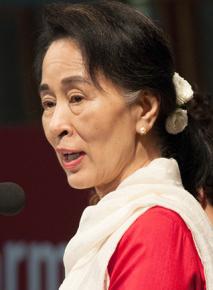Why won’t Aung San Suu Kyi speak out?
Thousands of people from a persecuted Muslim minority have been forced to flee Myanmar, or Burma, as a result of increasing repression by the country's military government. The Rohingya have been largely abandoned because no country would take them in--only recently did Malaysia and Indonesia announce they would accept some of the refugees.
Many people are asking why celebrated human rights figure and Nobel Peace Prize winner Aung San Suu Kyi and her National League for Democracy have refused to take a stand in defense of the Rohingya. explains why, in an article for the Australian newspaper Red Flag.
RETIRED SOUTH African archbishop Desmond Tutu has described the situation facing the Rohingyas, a persecuted minority in Burma, as "one of the most enduring human rights crises on Earth."
For Aung San Suu Kyi, veteran of the decades-long struggle against the military dictatorship in Burma and winner of the Nobel Peace Prize for her commitment to human rights and democracy, it's "complicated."
In a 2013 interview with the BBC, Suu Kyi's pitch centered on "understanding"--not of the desperate plight of the (mainly Muslim) Rohingyas, but of the prejudice and violence to which they've been subjected by the country's Buddhist majority. "There's fear on both sides...we would like the world to understand that the reaction of the Buddhists is also based on fear," she said.
But what does the Buddhist majority have to fear? They're not the ones being driven from their homes. They're not the ones who are denied citizenship and who face severe restrictions on access to health care, education and freedom of movement. They're not the ones forced to live in squalid refugee camps and to flee the country in their thousands on leaky boats.

According to Suu Kyi, however, it's more a matter of "Muslim power" in general, rather than anything specific: "I think we'll accept that there is a perception that Muslim power, global Muslim power, is very great, and certainly that's a perception in many parts of the world and in our country, too." Replace the word "Muslim" with "Jewish," and the parallels become very dark indeed.
So why would Suu Kyi, long the darling of Western liberal crusaders, so readily jettison her supposedly deeply held commitment to human rights in order to apologize for the racism and violence of Burma's ruling elite and Buddhist chauvinists?
It seems that in advance of a general election scheduled for October, Suu Kyi is concerned, above all, with her own popularity and that of the National League for Democracy, which she leads. Speaking out for the Rohingyas would not be a popular move.
First published at Red Flag.


